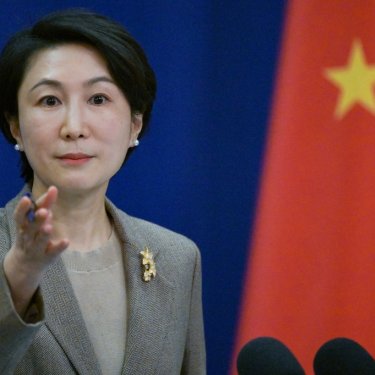Press freedom is not fully protected in Hong Kong: RSF debunks China’s claims in 10 points

During a press briefing following the deportation out of Hong Kong of a representative of Reporters Without Borders (RSF), a Chinese government spokesperson claimed that press freedom is “fully protected” in the territory. RSF sets the record straight with ten facts demonstrating the grim reality of Hong Kong’s press freedom downfall.
Press freedom in Hong Kong has been “fully protected” since the territory’s handover to China a quarter of century ago, Chinese Foreign Ministry spokesperson Mao Ning claimed during a press conference on 11 April 2024, following a question regarding the detention and deportation of a RSF representative out of Hong Kong airport the day before.
Detentions of journalists, media closures, harassment of press freedom defenders… RSF in 10 facts demonstrates that press freedom in Hong Kong is in free fall.
“To claim that press freedom reigns in Hong Kong is a blatant lie that does not withstand scrutiny. In recent years, the Chinese regime and the Hong Kong authorities have been leading an unprecedented campaign against independent journalism which notably resulted in the closing of eight media outlets and the prosecution for crimes against the state of a large number of journalists. We urge democracies to build up pressure so that press freedom is fully restored in the territory.
Ten facts illustrating the downfall of the territory’s press freedom
1 - To date, ten journalists and press freedom defenders are detained in Hong Kong, including Jimmy Lai, publisher and laureate of the 2020 RSF Press Freedom Prize, who faces the rest of his life behind bars on trumped-up national security law charges.
2 - Independent media outlets Apple Daily and Stand News were forcibly shut down in 2021 while the climate of fear led at least five other media outlets to cease operations. Most recently, broadcaster Radio Free Asia also announced it would close its bureau citing security concerns.
3 - Draconian national security and sedition provisions pose a constant threat to journalists. Since 2020, at least 28 journalists have been prosecuted for crimes against the state under the National Security Law (NSL) imposed by Beijing and other laws. Last month, the government adopted the “Article 23” law, which transposes in the domestic law the NSL provisions and introduces new offences such as espionage.
4 - In 2024 only, according to AFP, Hong Kong authorities have sent at least seven letters accusing foreign media outlets, including BBC, RFA, The Guardian, The Washington Post, The New York Times and Bloomberg, of publishing “misleading” articles about the newly-enacted “Article 23” national security provisions.
5 - Public broadcaster Radio Television Hong Kong (RTHK) has been placed under a government-appointed management. Previously renowned for its independent tone and fearless investigations, public broadcaster RTHK has been placed in 2022 under a government-appointed management that since openly applies censorship over the group’s productions and archives.
6 - Press freedom organisations and journalist associations have been harassed for years. Hong Kong Journalist Association (HKJA) chairman Ronson Chan was sentenced in 2023 to five days in prison for allegedly obstructing a police officer, while HKJA, an organisation with very modest income, was recently ordered to retroactively pay a whopping HK$400,000 (around €50,000) taxes.
7 - A large number of Hong-Kong based journalists experienced being followed and surveilled and hundreds of them were forced to go on exile. At least 900 journalists also lost their jobs due to the closure of the independent media that employed them.
8 - News articles and op-eds are used as evidence in court against press freedom defenders and journalists. In the ongoing Stand News trial, for example, 17 articles have been used as evidence to prosecute two editors-in-chief, who face a maximum of 2 years in prison for sedition.
9 - Last year, at least three freelance journalists were barred from entering the territory on separate occasions. Upon their arrival, Japanese reporters Michiko Kiseki and Yoshiaki Ogawa, and US reporter Matthew Connors, who all three documented the 2019 pro-democracy demonstrations in Hong Kong, were questioned about their past reporting, and briefly detained, before being denied entry without further explanation.
10 - Hong Kong ranks 140th out of 180 in RSF’s 2023 World Press Freedom Index, having plummeted from 18th place in two decades. China itself ranks 179th out of 180 countries and territories evaluated.
